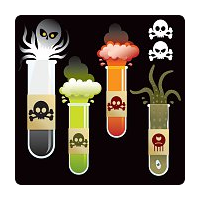Armed with New Authority to Ban Dangerous Substances, EPA Begins Review of Widely Used Toxic Chemicals
 (graphic: MightyIsland, Getty Images)
(graphic: MightyIsland, Getty Images)
By Michael Biesecker, Associated Press
WASHINGTON (AP) — The Environmental Protection Agency on Tuesday released a list of toxic chemicals that will be the first reviewed under a recently enacted law that gives regulators increased authority to ban substances shown to endanger human health.
EPA's move comes after a key revision to the Toxic Substances Control Act that passed Congress earlier this year with broad bipartisan support. The list includes such common chemicals as asbestos and trichloroethylene that have for decades been known to cause cancer, yet EPA lacked the legal authority necessary to ban their use.
Over the next three years EPA will study whether the listed chemicals present an "unreasonable risk to humans and the environment." The agency will then have another two years to mitigate that risk through new regulations, which could include banning the chemicals from use in the United States.
Once EPA completes its review of the initial 10 chemicals, studies will begin on dozens of other suspect chemicals. With tens of thousands of chemicals manufactured each year within the U.S. or imported from other countries, EPA is prioritizing those that are the most dangerous and widely used.
"Under the new law, we now have the power to require safety reviews of all chemicals in the marketplace," said Jim Jones, assistant administrator of EPA's Office of Chemical Safety and Pollution Prevention. "We can ensure the public that we will deliver on the promise to better protect public health and the environment."
Valued for its resistance to heat and corrosion, asbestos was widely used for decades in such products as building materials, pipe insulation and floor tiles before studies linked it to lung cancer and other diseases. EPA first tried to ban the use of asbestos in 1989, but its decision was struck down two years later by a federal appeals court that ruled the agency had exceeded its authority.
Though most domestic manufacturers voluntarily stopped using asbestos in commercial products, it can sometimes still be found in imported products such as automotive brake pads.
EPA's action comes less than two months before the inauguration of President-elect Donald Trump, a frequent critic of EPA regulations that might negatively impact business profits. Overseeing Trump's transition team for the agency is Myron Ebell of the Competitive Enterprise Institute, a libertarian think tank funded by corporate interests.
The institute runs a website that promotes the "life-enhancing value of chemicals" while sowing doubt about "fear-mongering" scientific studies that show risks to human health and the environment from pesticides and other products. Earlier this year, CEI issued an opinion article criticizing the expansion of EPA's authority to regulate toxic chemicals and questioning the need for an asbestos ban.
Environmental and consumer safety advocacy groups on Tuesday praised the EPA's move, but also expressed concern about whether the incoming administration will embrace the process.
"Today's historic action by the EPA will finally begin the process of restricting the remaining sources of asbestos, which is responsible for the deaths of hundreds of thousands of Americans," said Sonya Lunder of the Environmental Working Group Action Fund, which studies toxic substances. "We expect the incoming Trump administration to uphold the EPA's commitment and honor the past, current and future victims of asbestos-triggered diseases."
To Learn More:
EPA Uses New Law for Quick Action to Reduce Risk of 5 Toxic Chemicals (by Tim Ryan, Courthouse News Service)
Congress Reaches Bipartisan Safety Standards Agreement for Dangerous Chemicals (by Matthew Daly, Associated Press)
Chemical Industry Self-Policing Called into Question, Government Oversight Lax (by Steve Straehley, AllGov)
Chemical Industry and Republican Lawmakers Succeed in Stalling EPA Chemical Regulation Process (by Steve Straehley, AllGov)
Clashing Chemical Safety Bills: Industry vs. Consumers (by Steve Straehley, AllGov)
- Top Stories
- Unusual News
- Where is the Money Going?
- Controversies
- U.S. and the World
- Appointments and Resignations
- Latest News
- Trump Renames National Football League National Trump League
- Trump to Stop Deportations If…
- Trump Denounces World Series
- What If China Invaded the United States?
- Donald Trump Has a Mental Health Problem and It Has a Name






Comments